29 Nov 2013 | News, Uganda
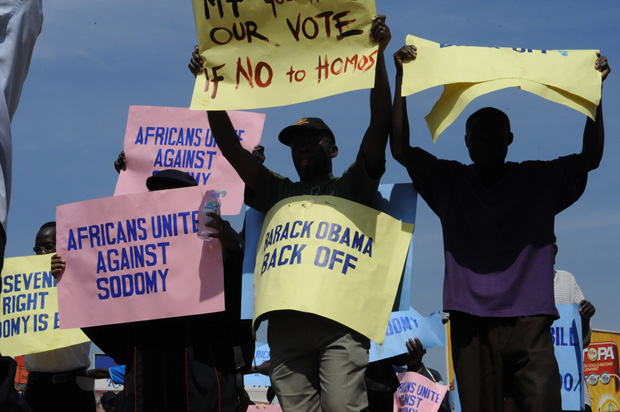
Hundreds of Ugandans took to the streets in support of the government’s proposed anti-homosexuality bill in 2009 (Image: Edward Echwalu/Demotix)
The Ugandan government’s position on homosexuality is considered one of the harshest in the world. The proposed Anti-Homosexuality Bill, seeks to, among other things, broaden the criminalisation of homosexuality so that Ugandans who engage in same-sex relations abroad can be extradited to Uganda and charged. Originally, some of the provisions in the law called for death penalties or life sentences for those convicted as homosexuals. It has since been amended to remove the proposal of death penalties, but the life sentences remain.
A special motion to introduce the legislation was passed only a month after a two-day conference where three American Christians asserted that homosexuality is a direct threat to the cohesion of African families. Indeed, the church — both Anglican and Catholic — plays a big role in shaping the government’s tough stance on homosexuality. New Pentecostal churches are also fuelling the anti-gay message, with firebrand crusaders like Pastor Martin Sempa at the forefront.
Together, the state and the church accuse the gay community of recruiting young people in schools. There have also been claims that gay people are recording sex videos with young Ugandans that they then sell abroad. It is said that young people are lured into this with promises of financial gains. Sixty-five-year-old Brit Bernard Randall is facing trial for engaging in gay sex, and for possession of videos of him engaging in gay sex.
Anti-gay legislation has been in place in Uganda for some time. Laws prohibiting same-sex sexual acts were first introduced under British colonial rule in the 19th century, and those were enshrined in the Penal Code Act 1950. Section 146 states that “any person who attempts to commit any of the offences specified in section 145 commits a felony and is liable to imprisonment for seven years.” On 29th September 2005, President Museveni also signed a constitutional amendment prohibiting same-sex marriages.
But the anti-gay bill is not the only story on this topic to come out of Uganda in recent times. In 2004, the Uganda Broadcasting Council fined Radio Simba $1,000 for hosting homosexuals on one of its shows, and the radio station was forced to make a public apology. In January 2011, LGBT activist David Kato was killed. Kato, together with Patience Onziema and Kasha Jacqueline, had successfully sued a Ugandan paper the Rolling Stone and its Managing Editor Giles Muhame. The paper had published their full names and photos, as well as those of a number of other allegedly gay people and called for the lynching of all homosexuals. The court issued a permanent injunction preventing the paper and the editor from publishing the identities of any other homosexuals. Kato’s murderer, Enoch Nsubuga, was handed down a 30-year prison sentence.
On 3 October 2011, a local human rights and LGBT activist challenged a part of the Equal Opportunities Commission Act in the Constitutional Court. Section 15(6)(d) prevents the Equal Opportunities Commission from investigating “any matter involving behaviour which is considered to be (i) immoral and socially harmful, or (ii) unacceptable by the majority of the cultural and social communities in Uganda.” The petitioner argued that this clause is discriminatory and violates the constitutional rights of minority populations. A decision has not yet been made on the petition.
The bill has, however, caused the most outrage. The Ugandan government and the evangelicals faced immense international criticism, and the bill was met with protests from LGBT, human rights and civil society groups. Countries including Sweden even threatened to stop their aid to Uganda in protest.
In response to the attention, the bill was revised to drop the death penalty, and President Yoweri Museveni formed a commission to investigate the possible repercussions of passing it. The Speaker of the Ugandan parliament promised in November 2012 the bill would pass by the end of the year as a Christmas gift for the group that supported it. It is, for now, still on hold. But while the Ugandan government has toned down its rhetoric against the gay community lately — this is believed to be due to international pressure — the persecution of gay people in the country persists.
This article was originally posted on 29 Nov 2013 at indexoncensorship.org
29 Nov 2013 | Academic Freedom, News, United Kingdom
In bid to address the issues surrounding people with extremist views giving talks at British campuses, Universities UK recently released new guidelines on external speakers. “Universities have to balance their obligation to secure free speech with their duties to ensure that the law is observed — which includes promoting good campus relations and maintaining the safety and security of staff, students and visitors,” says the body, which represents vice-chancellors.
This is not the first time they have spoken out about the topic. However, a set of guidelines from 2011 reads: “It is the law alone which can set restrictions on freedom of speech and expression and on academic freedom — it is for the law and not for institutions or individuals within institutions to set the boundaries on the legitimate exercise of those rights”. It appears they are calling for somewhat stricter regulation this time around. The current guidelines are also more in line with the view of the National Union of Students, which maintains that “(…) many students’ unions may wish to go further than the law on securing ‘freedom from harm’ when restricting some speaker activity.” The NUS’ own “No Platform” policy, banning certain speakers from their events, puts this theory into practice.
This is one of those topics that seems to come up at fairly regular intervals, and the outline of the debate is familiar by now. One side argues that speakers with outwardly hateful or discriminatory views don’t deserve a platform through which to legitimate them; while the other side argues that to deny them this is to deny them the right to freedom of expression, which also extends to those with whom we disagree. The following speakers have been responsible for at one point reigniting the debate, each in their own way.
1) Nick Griffin
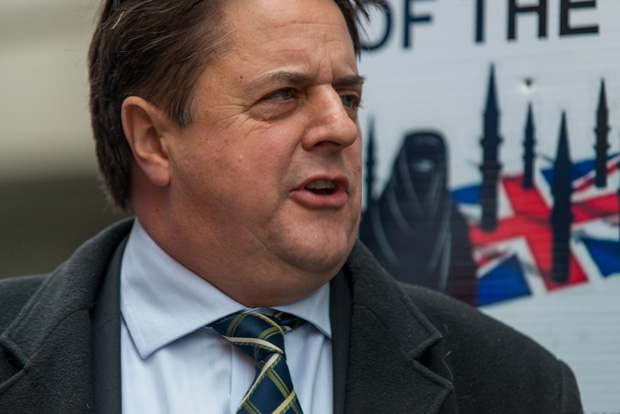
Nick Griffin outside the Old Bailey court on the first day of the trial of the murder of Lee Rigby (Image: Velar Grant/Demotix)
The most famous case in recent years was the 2007 appearance of BNP leader Nick Griffin (and Holocaust-denying historian David Irving) at an Oxford Union debate on free speech. The invitation caused massive uproar, with protesters picketing the event. “It is not just an Oxford issue, this will have ramifications for other places where the BNP are active… this is going to give legitimacy and credibility to their views,” said Student Union President Martin McClusky at the time. “I find the views of the BNP and David Irving awful and abhorrent but my members agreed that the best way to beat extremism is through debate,” argued Oxford Union president Luke Tryl. This is not only time the Nick Griffin has caused controversy as a potential university speaker. Trinity College Dublin cancelled plans to include him in a debate immigration, saying “it could not guarantee the safety and wellbeing of staff and students”.
2) Mufti Ismail Menk
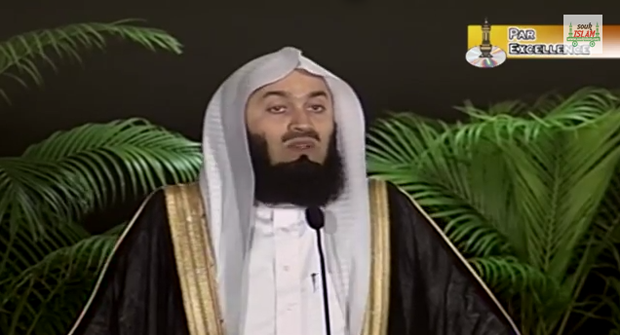
Mufti Ismail Menk giving a lecture (Image: soukISLAM/YouTube)
Islamic preacher Mufti Ismail Menk spoke at Liverpool University earlier this month. He has previously stated that gay people are “filthy” and “worse than animals”. The event was initially reported to be part of a longer tour stopping at Glasgow, Leeds, Liverpool, Leicester, Cardiff and Oxford universities. However, all except Liverpool, where he was hosted by the Islamic Society, revoked their invitation or said he had not been officially invited in the first place. Liverpool responded that it is “not the role of the university to censor people’s views”.
3) Mohamed El-Nabawy
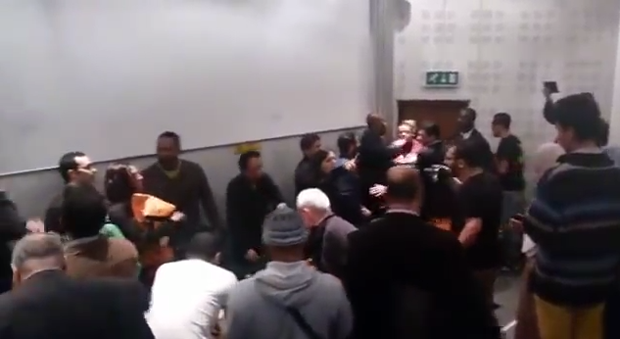
A video captured the protest that erupted when Mohamed El-Nabawy was due to speak at SOAS (Image: YouTube)
A representative of Tamaroud, the grassroots movement which played a significant role in the ousting of Egypt’s Muslim Brotherhood-backed elected government, was chased away by angry protesters prior to a scheduled talk at London’s School of Oriental and African Studies (SOAS). The protesters, who were not students, chanted and brandished posters associated with the Muslim Brotherhood at the open lecture. SOAS security had to escort El-Nabawy off campus using an emergency exit . A spokeswoman for the Palestinian Society, which had organised the talk, said: “In the pursuit of freedom of speech and expression, some people may find some of the views expressed at our events objectionable.”
4) David Gale
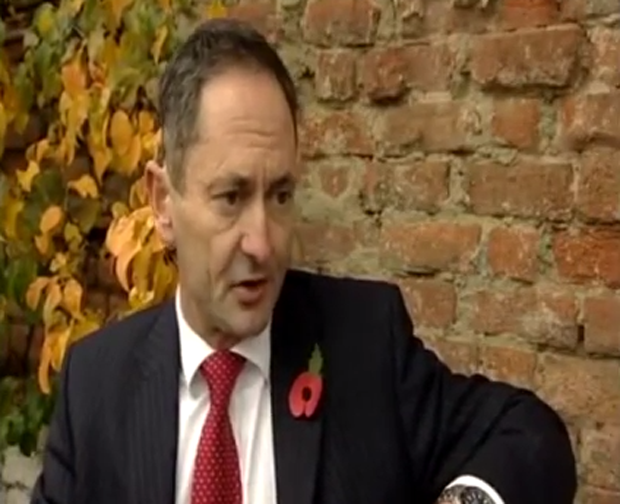
David Gale on the BBC’s Sunday Politics Show (Image: UKIPDerby/YouTube)
In 2012 the Student Union at the University of Derby banned David Gale, UKIP’s candidate for Police and Crime Commissioner, from taking part in a Q&A session at the university. The Union has a no platform policy for “individual(s) who they believe to be a member of a group with racist, fascist or extremist views”, a category the Union believed was applicable to UKIP . UKIP leader Nigel Farage weighed in on the issue at the time, saying: “It is frightening that a Derby student body is so frightened of free speech and public opinion.”
5) George Galloway
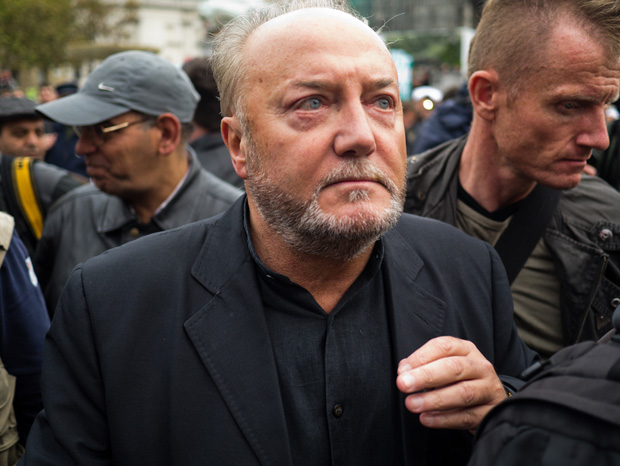
George Galloway attends an anti-war rally in 2011 (Image: Paul Soso/Demotix)
In March, George Galloway was set to speak at an event organised by the University of Chester Debating Society. However, the invitation was revoked by the Student Union, acting in line with the NUS’ No Platform policy on Galloway. This move came after the Respect Party MP was involved in a string of controversial incidents, including refusing to debate with an Israeli student at an Oxford University panel discussion. Galloway’s camp have called the policy “idiotic, anti-democratic and politically-motivated”.
6) Julie Bindel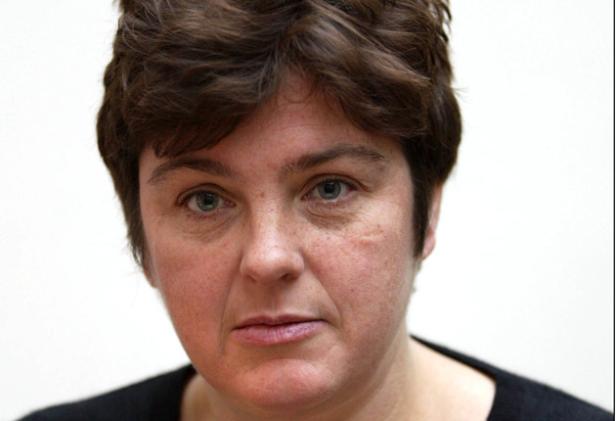
In September, the Debating Union at Manchester University (MDU) invited feminist writer and campaigner Julie Bindel to speak at their discussion on pornography. A number of people objected due to Bindel’s reported views about transexual people, which have led to the NUS implementing a No Platform policy for her. Some transexual students and their supporters “felt Julie Bindel’s transphobic statements and views made them both unwelcome at the event, and unsafe on campus, as it seemed that transphobia was being allowed and possibly encouraged,” said Loz Webb, the university’s Trans* representative. Despite this, MDU refused to replace Bindel, though she eventually chose to drop out after receiving death threats.
This article was originally posted on 29 Nov 2013 at indexoncensorship.org
29 Nov 2013 | Czech Republic, Europe and Central Asia
Nominations are now open for a writing award for people and organisations contributing to the profile of Czech literature around the world.
The award, set up to commemorate a former editor of Index on Censorship magazine, is presented at the Prague Book Fair in May. The prize was first awarded in 2011 with freedom of expression in mind, and is given to a person or an organisation outside of the Czech Republic contributing in a major way to the promotion and dissemination of Czech literature abroad. The winner is chosen by a five-person jury, and also receives a prize of £1000. Nominations close on 15 February.
World of Books, which runs the annual Prague Book Fair, set up the literary award to commemorate George (Jiri) Theiner. He found his niche in England as Index on Censorship’s deputy editor in the 1970s and, following Michael Scammell’s departure, as the editor in the 1980s. George was held in high regard by writers and poets in Czechoslovakia not least because he worked tirelessly to publicise their fate and their work through translation into English. They included Vaclav Havel, Ivan Klima, Ludvik Vaculik, Bohumil Hrabal and others post 1968, or poets such as Miroslav Holub and Antonin Bartusek pre 1968.
The first recipient of the prize was Andrzej Slawomir Jagodzinski, a prolific journalist and translator of Czech literature into Polish who, from 1976 onwards, was closely involved in the Polish and Czech democratic opposition. After the collapse of the totalitarian regimes in central and eastern Europe he became the director of the Polish Cultural Centre in Prague.
The 2012 prize winner Ruth Bondy is a representative of the Czechoslovak pre WWII generation of intellectual Jews who, like many others, was deported to Theresienstadt and subsequently to Auschwitz and, towards the end of the war, to Germany. She moved to Israel in 1948 and worked as a journalist on the Hebrew daily Davar. She taught journalism at the Tel Aviv University in the 1980s and 1990s. She has translated a diverse group of Czech authors into Hebrew (including Hasek and Hrabal) and written studies centred on the fate of Czech Jews during the Holocaust.
Last year the prize was received by Paul Wilson, a journalist, literary critic and translator of many of Vaclav Havel’s works into English. He was closely associated with the persecuted band Plastic People of the Universe, as a result was thrown out of Czechoslovakia in the early 1970s. He has remained a committed publicist of Czech causes and authors.
29 Nov 2013 | News, Turkey, Turkey Uncensored
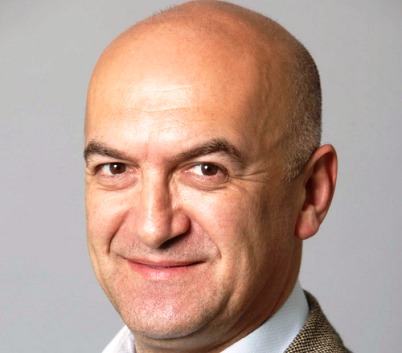
Yavuz Baydar
Turkey’s “mainstream” media, politically and economically in shackles is moving towards submitting to the kind of conditions like those in Central Asian republics such as Azerbaijan. This progression was plain for all to see on live television this week.
Tuesdays have for a long time turned into political shouting matches in Ankara. Stretching the boundaries of parliament’s bylaws, leaders of the parties assemble deputies in so- called group meetings in the lawmakers’ building, where they unleash propaganda.
These appearances are, as obliged by law, broadcast by the state-run TRT channels.
But, as Turkey’s Prime Minister Recep Tayyip Erdoğan has systematically tightened the screws over the proprietors of the conglomerate media, all the national private news channels – there are at least 15 of them – for months turned this custom into a routine of airing his lengthy, loud speeches without interruption.
Last Tuesday, the disturbing pattern went even further. It was the the beginning of the local elections campaign, so Erdoğan let media know that he would announce the names of some of the minor mayoral candidates, in the group meeting.
Amid pomp and circumstance, he did. The entire meeting was meticulously designed as a massive propaganda show for the AKP, backed with lengthy video clips on the achievements in each and every city. And the private media followed herdlike in airing it live.
Many wondered whether Turkey had turned into Azerbaijan or Turkmenistan overnight.
“Unbelievable!” wrote Hasan Cemal, a veteran colleague who was forced to leave Milliyet daily for his defence of good journalism 6 months ago. “Election propaganda that can only be done by paid adverts was sent live on all the channels. This can never happen in any democratic country. I would not wish to be in the place of my colleagues who had to do this.”
The truth of the matter is, by each step, because of the enthusiastic consent of media proprietors in Turkey, either blinded by greed, or frightened to submission or both – to surrender fully to the will of political power, there is not much basic journalism left in the country. All this has been happening against the background of Turkey’s accession process with the European Union.
in a recent update of two earlier reports by the liberal think-tank, TESEV, dated 2011 and 2012, Dr Ceren Sözeri of Galatasaray University concluded that “the media owners are increasingly winning the important public tenders in proportion to their sizes, and the role of their media operations during this process cannot be underestimated. It also explains why the media owners please the government at every possible occasion…”
Sözeri added that businesses that own the big media outlets win important public tenders in direct proportion to their weight in the media sector.
Commenting in a recent article on Turkish conglomerate media’s shady relations with the government, Barış Altıntaş, a colleague from daily Today’s Zaman wrote “it is no wonder readers rarely see stories about shady business dealings involving government agencies, although it is no secret that corruption, especially in public tenders, is rampant in Turkey.”
As a consequence, whatever remains of editorial independence at the center of Turkish journalism, as Tuesday’s spectacular media cooperation displayed, has been eroded further. The new media order being cemented is run by a control-obsessed prime minister, submissive media barons, civil-servant type puppet editors in chief, ostrich-like newsrooms and frightened or weary reporters.
Turkey’s needy public is kept farther away from truth; and instead bombarded by propaganda.
The lack of solidarity within the profession is remarkable. As the screws are tightened further, one of the greatest stories unfolding was about the National Intelligence Agency of Turkey (MIT), which wiretapped a group of journalists with the consent of the Prime Ministry.
Independent-secularist daily Cumhuriyet reported the story that a classified document signed by the head of MIT was sent to the Prime Ministry and that Prime Minister Erdoğan gave approval to the wiretapping of some journalists and writers, that the “necessary coordination was made with the judiciary,” and that MIT carried out the wiretappings. According to the daily, phones of journalists Yasemin Çongar, Mehmet Baransu, Amberin Zaman and Mehmet Altan were wiretapped.
When the story was first revealed last year, the journalists filed a criminal complaint against MIT, and a legal case was opened. An İstanbul court hearing the case earlier asked MİT why the journalists were wiretapped by the organization. The organisation sent a response to the court and said the wiretapping was carried out legally and the phones of the journalists were wiretapped for the ‘benefit of the public’.
Cumhuriyet’s story received no denials from the authorities. One of the targeted journalists, Mehmet Altan, told daily Taraf “[T]his one is a big scandal and constitutional breach.
“This document of directive, signed by the prime minister and head of MIT shows that the authorities do not take seriously its own constitution nor its laws, which were also violated by a cooperation between MIT and the judiciary” he said.
Perhaps not so surprisingly, the story – which is earth-shattering in its essence, revealing the worrisome trends in Turkey against the very core of media freedom and right to privacy – was almost entirely ignored by the conglomerate media, and covered only by a very few small outlets.
One of the few objections to the self-censorship over the story came from Doğan Akın, Editor of the independent web site T24, who in a bitter column accused the entire journalism corps of what he called “not being able to cry out, with mouths shut”.
He bashed media barons for ‘buying opression on journalism’ and ‘investing only on fear’ for the sake of their other business interests.
Another colleague, Abdullah Bozkurt, Ankara Bureau Chief of daily Today’s Zaman, expressed profound concern that media has become toothless and added another dimension:
“Considering the widespread allegations that MIT has been putting journalists on its payroll in Turkey, financing reporters through clandestine activities to promote the agency and to clutter the information space through unscrupulous reporting fed to them by the agency, the media’s public interest advocacy role is very much diluted.”

Turkey Uncensored is an Index on Censorship project to publish a series of articles from censored Turkish writers, artists and translators.









